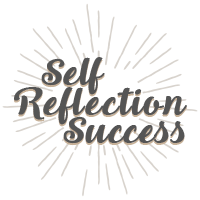Why Self-Reflection is Important To Have A Happy Life
Self-reflection is important to have a happy life because it allows us to take a step back, assess our lives and our choices, and decide whether there is a better way to live or not.
Additionally, self-reflection can help you to reduce stress, improve learning, and increase self-awareness. These benefits can lead us to a fulfilling and more happy life.
Self-reflection is important because it allows us to learn from our mistakes, monitor our own progress, and see things from different perspectives. It also helps us to build self-awareness, which is a key life skill.
So when we take the time to reflect on our own behaviour and actions, we can better understand why we did something and how we can improve in the future.
Increase Your Self-Awareness
One way to increase self-awareness is to take the time for self-reflection.
You should spend some time alone in a quiet environment where you can focus on yourself without distraction. Take note of how you’re feeling, what’s going through your head, and what emotions are present. Identifying these feelings can help you better understand yourself, which will lead to greater self-awareness over time.
Another way to increase self-awareness is by talking with people who know you best. Ask them for honest feedback on your strengths, weaknesses, and areas that could use improvement. The answers you receive may surprise you!
They may also be able to give helpful advice on how to grow in different areas of life or work-related topics.
Also, developing self-awareness is an essential part of personal growth. It can help us become more aware of our strengths and weaknesses, as well as how we interact with others.
Increasing self-awareness can help us become a better version of ourselves, both personally and professionally.
Finally, through self-reflection, we can improve our self-awareness and create a positive mindset. We should not be afraid to try something new or challenge ourselves in ways that make us uncomfortable. Doing so allows us to learn more about ourselves as we discover our limits and capabilities.
Self-reflection is the key to self-awareness because it allows us to look at ourselves objectively and see our thoughts, feelings, emotions, and actions neutrally.
Improve Your Decision-Making Skills
Self-reflection is important for improved decision-making skills for a couple of reasons.
One is taking the time to reflect on our actions and decisions which can help us make better choices in the future. It is a way to gain insight into ourselves, allowing us to understand our strengths and weaknesses and identify areas where we need to make changes. By being aware of how our thoughts, feelings, and behaviour influence each other, we can develop more effective decision-making skills.
Additionally, self-reflection can help us learn from past mistakes. By taking the time to reflect on poor decisions, we can avoid making the same errors in the future.
One way to do this is by creating a “thought diary†or journal where you can record the details of situations that arise during the day.
Writing down what happened in each situation, how it made you feel, what thoughts went through your head, and how you handled it can allow you to look back and assess how well things worked out in hindsight.
You may find that some decisions were good ones while others could have been handled differently for more positive outcomes.
By taking the time for regular self-reflection, you can learn from past experiences and improve upon them going forward. This will ultimately help shape better decision-making skills that lead to better outcomes in both personal and professional life.
Increase Your Productivity
Self-reflection is a great way to become more aware of our thought patterns and how they affect our productivity.
By taking the time to reflect on our day, we can find areas where we may have become distracted or wasted time. This can help us to be more mindful in the future and make better decisions about how to use our time.
Self-reflection can also help us to set goals for ourselves. By taking the time to think about what we want to achieve, we can develop a plan of action to help us reach our goals.
This can lead to increased productivity as we will have a clear direction to follow.
Another benefit of self-reflection is that it can help us to improve our time management skills. By identifying how we spend our time, we can adjust to ensure that we are using our time efficiently.

Girl Sitting on a Bench Self-Reflecting
Improved Your Mental Health
Self-reflection is a powerful tool for improved mental health. Â When we take the time to reflect on our experiences, thoughts, and feelings, we can gain valuable insights about ourselves and our relationships and develop a plan for moving forward.
This kind of introspection also allows us to become more aware of our emotions, which ultimately leads to more effective coping skills when dealing with difficult times.
Taking the time to reflect on our life can be a powerful tool for making positive changes and improving our mental health.
By understanding what we’re feeling, we can better manage how we react to situations that cause distress or anxiety. Self-reflection also encourages self-compassion and kindness towards us – something that we struggle with – allowing us to be more forgiving of ourselves when making mistakes or facing challenging circumstances.
Finally, regular self-reflection gives us an opportunity for personal growth. These insights can help us better understand the causes of our mental health struggles and how to make positive changes in our life.
Develop a Better Understanding of Your Values and Beliefs
We all have our values and beliefs, but it can be difficult to understand why we have them. Self-reflection is the key to understanding why we think and feel the way we do.
It’s an important way to learn more about us and our motivations so that we can better understand our values and beliefs.
Self-reflection starts with asking questions. We need to ask ourselves what matters most to us, what drives us, and why we make certain decisions or take certain actions.
We also need to consider how our values and beliefs shape our relationships with others and how they may impact our future goals.
By taking time for self-reflection, we can gain a better understanding of who we are as individuals and how that affects the way we live life.
Being mindful of our values and beliefs helps us to make more informed decisions about the people in our lives, the career paths that interest us, or even the type of lifestyle that best suits us.
Self-reflection is a powerful tool that can help us gain a better understanding of ourselves so that we can make wiser choices in life.
Increase Your Confidence and Self Esteem
Self-reflection is a crucial part of self-awareness. It allows us to look neutrally at our thoughts, feelings, emotions, and behaviours to better understand them.
As we become more aware of ourselves, we can begin to accept our strengths and weaknesses and develop a greater sense of confidence.
With increased self-awareness comes increased self-esteem, which refers to a belief in our skills and abilities.
Developing a strong sense of self-confidence and self-esteem can improve our mental and social well-being by influencing our aspirations, personal goals, and interactions with others.
Self-reflection is one of the best ways to increase our self-confidence and self-esteem. It helps to build a sense of self-awareness and understanding and it boosts confidence and self-esteem.

Self-Reflection Image
Effective Ways to Engage in Self-Reflection
When reflecting on yourself, start with setting aside a specific time each day or week to reflect on your thoughts, feelings, and behaviour.
Get a Journal and write down your thoughts, feelings, and experiences. This can help you gain insight into your patterns of behaviour and find areas for growth.
Spend time in quiet meditation, focusing on your thoughts, feelings, and bodily sensations. This can help you become more aware of your inner experience and gain clarity about your emotions and behaviour.
Ask friends, family members, or colleagues for honest feedback about your behaviour and interactions with others. This can help you gain a different perspective on yourself and identify areas for improvement.
Reflect on past events or interactions and analyse your behaviour.
- What did you do well?
- What could you have done differently?
- What can you learn from the experience?
Reflect on how your core values affect your thinking and behaviour. Are you living according to your values? If not, how can you improve the way you reflect your values in your actions?
Be kind and understanding with yourself as you engage in self-reflection. Acknowledge your flaws and mistakes without judgment and use them as opportunities for growth and learning.
Use your self-reflection to set goals for personal or professional growth. Find areas where you want to improve and create a plan for how to make changes.
Final Word
In conclusion, self-reflection is a crucial aspect of personal growth and development.
Engaging in self-reflection helps you to increase your self-awareness, improve decision-making skills, boost productivity, enhance mental health, gain a better understanding of your values and beliefs, and increase confidence and self-esteem.
Through self-reflection, you can find your strengths and weaknesses, acknowledge your mistakes, learn from your experiences, and make positive changes in your life.
By taking the time to reflect on our actions, emotions, and thoughts, we become more mindful of our behaviour, and we can develop a deeper understanding of ourselves and our relationships with others.
Effective ways to engage in self-reflection include journaling, mindfulness meditation, seeking feedback from others, and taking time to reflect on our experiences.
It is essential to create a safe and comfortable environment that allows for introspection and honest self-assessment. Therefore, practicing self-reflection is an invaluable tool that can lead to personal growth and transformation.
By increasing our self-awareness and understanding, we can better prepare ourselves for the challenges and opportunities that come our way, leading to a more fulfilling and meaningful life.



